Angela Ackerman's Blog: Writers Helping Writers, page 66
April 20, 2021
Phenomenal First Pages Contest
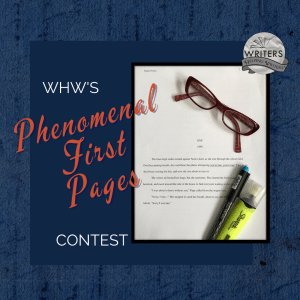 Hey, wonderful writerly people! It’s time for our monthly first-page critique contest
Hey, wonderful writerly people! It’s time for our monthly first-page critique contest 
If you���re working on a first page (in any genre except erotica) and would like some objective feedback, please leave a comment. Any comment :). As long as the email address associated with your WordPress account/comment profile is up-to-date, I���ll be able to contact you if your first page is chosen. Just please know that if I���m unable to get in touch with you through that address, you���ll have to forfeit your win.
Two caveats:
 Please be sure your first page is ready to go so I can critique it before next month���s contest rolls around. If it needs some work and you won���t be able to get it to me right away, let me ask that you plan on entering the next contest, once any necessary tweaking has been taken care of.
Please be sure your first page is ready to go so I can critique it before next month���s contest rolls around. If it needs some work and you won���t be able to get it to me right away, let me ask that you plan on entering the next contest, once any necessary tweaking has been taken care of.
 I���d like to be able to use portions of winning submissions as illustrations in an upcoming presentation on first pages. By entering the Critiques 4 U contest, you���ll be granting permission for me to use small writing samples only (no author names or book titles).
I���d like to be able to use portions of winning submissions as illustrations in an upcoming presentation on first pages. By entering the Critiques 4 U contest, you���ll be granting permission for me to use small writing samples only (no author names or book titles).
Three commenters��� names will be randomly drawn and posted tomorrow morning. If you win, you can email me your first page and I���ll offer my feedback.
We run this contest on a monthly basis, so if you���d like to be notified when the next opportunity comes around, consider subscribing to our blog (see the left-hand sidebar).
Best of luck!
The post Phenomenal First Pages Contest appeared first on WRITERS HELPING WRITERS��.
April 17, 2021
Relationship Thesaurus Entry: Executive and Personal Assistant
Successful stories are driven by authentic and interesting characters, so it���s important to craft them carefully. But characters don���t usually exist in a vacuum; throughout the course of your story, they���ll live, work, play, and fight with other cast members. Some of those relationships are positive and supportive, pushing the protagonist to positive growth and helping them achieve their goals. Other relationships do exactly the opposite���derailing your character���s confidence and self-worth���or they cause friction and conflict that leads to fallout and disruption. Many relationships hover somewhere in the middle. A balanced story will require a mix of these dynamics.
The purpose of this thesaurus is to encourage you to explore the kinds of relationships that might be good for your story and figure out what each might look like. Think about what a character needs (good and bad), and build a network of connections for him or her that will challenge them, showcase their innermost qualities, and bind readers to their relationship trials and triumphs.

Description: Executives are busy people who very often will hire a personal assistant to handle their administrative needs. The assistant’s responsibilities may be strictly professional (scheduling appointments, fielding phone calls, taking notes during meetings, etc.) or also personal (ordering a gift for the nephew’s graduation, planning meals and shopping for groceries, etc.). Whatever the agreed-upon duties, a personal assistant uses their skills to keep all the executive’s plates spinning.
Relationship��Dynamics:
Below are a wide range of dynamics that may accompany this relationship. Use the ideas that suit your story and work best for your characters to bring about and/or resolve the necessary conflict.
A strictly professional relationship, where personal topics and conversations don’t typically come up
A cozier relationship���professional, but with each person knowing and caring about the other’s personal life
A strong professional relationship between two people who may not get along on a personal level
An assistant who takes initiative and an executive who trusts them to do their job well
A micromanaging executive who doesn’t trust his assistant with meaningful tasks
A disorganized or uncommunicative boss who makes the assistant’s job difficult
A selfish executive who expects the assistant to constantly be at their beck and call
An executive who expects more of the assistant (personally or professionally) than they should
An assistant who lacks confidence, needing a lot of hand-holding for new or high-pressure tasks
A pushy assistant who constantly oversteps her bounds
Conflicting Desires that Can Impair the Relationship
One party becoming romantically interested in the other
An ambitious executive’s changing needs causing tension for an assistant who is happy with the status quo
The executive wanting to build a team but the assistant wanting to keep things simple and more personal
An assistant taking the job solely because they want access to sensitive information or the executive’s contacts
An executive wanting the assistant to work long hours while the assistant wants to be more available for their family
An assistant with a personal secret that the executive is eager to ferret out
Clashing��Personality Trait��Combinations: Controlling and Independent, Cruel and Just, Disloyal and Trusting, Disorganized and Fussy, Thrifty and Extravagant, Flaky and Sensible, Gossipy and Private
Negative Outcomes of Friction
The assistant being fired
The assistant becoming resentful, leading to them seeking vengeance against the executive
An assistant burning out and becoming less effective
Things becoming awkward at work
One party domineering and controlling the other
A lack of trust eroding the relationship
Negative feelings factoring into the assistant’s performance review
Important assignments or business relationships getting caught in the crossfire, resulting in lost professional opportunities
One party losing respect for the other
Fictional��Scenarios That Could Turn These Characters into Allies
Joining forces to take down a common enemy, such as the executive’s rival or a new business owner
A personal tragedy for one party that encourages the other to take up their cause
The assistant playing matchmaker so the executive will find romance and be around less often
The assistant being unable to work, and the executive meeting a need that solves the problem (such as providing transportation, childcare, or medical services) so the work relationship can continue
Both parties coming together to attain something they both want, such as a bigger office or the business acquiring a prestigious partner
Ways This Relationship May Lead to Positive Change
One party’s workaholic ways can be challenged when they see the other’s fulfilling personal life
A doormat assistant may learn to stand up for him or herself and set healthy boundaries
Both parties may learn the importance of keeping things professional at work
An assistant may learn important skills or knowledge from the boss, becoming better at their job and advancing professionally
Either party may overcome prejudice
An older executive may become more relevant due to a younger assistant’s influence
Themes and Symbols��That Can Be Explored through This Relationship
A Fall from Grace, A Quest for Knowledge, Betrayal, Crossroads, Disorder, Enslavement, Freedom, Friendship, Greed, Inflexibility, Perseverance, Pride, Sacrifice, Teamwork
Other Relationship Thesaurus entries can be found here.
 Need More Descriptive Help?
Need More Descriptive Help?While this thesaurus is still being developed, the rest of our descriptive collection (15 unique thesauri and growing) is accessible through the One Stop for Writers THESAURUS database.
If you like, swing by and check out the video walkthrough, and then give our Free Trial a spin.
The post Relationship Thesaurus Entry: Executive and Personal Assistant appeared first on WRITERS HELPING WRITERS��.
April 13, 2021
Use Your Fiction Skills to Earn Money

Authors are a talented bunch. We���re adept at creating worlds and characters that engage our readers and keep them turning the pages. All these skills we learn���grammar, punctuation, pacing, layering, syntax���are valuable tools we can utilize in other forms of written communication to develop other income streams.
No matter where you are in your author journey, there���s the opportunity to use your fiction skills in different areas.
Content and Copy WritingIf you have a career in another field���IT, for example���you can find work as a content writer for organizations, magazines, and websites with a readership in your field of expertise. Alternatively, if you���re an excellent researcher and can understand industries you haven���t worked in, you can utilize these skills and write content. If your skill is writing content that is designed to sell a product or service, you may want to pursue copy writing.
Professional Writing Services
Manuscript assessment, copy editing, proofreading, and transcription are all excellent ways to earn money. However, not every writer will make a great manuscript assessor or copy editor, so it���s only worth pursuing if you are serious about this. It���s advisable to enroll in a writing and editing course, as it will strengthen your abilities and ensure you are offering a service clients are happy with.
If you have a talent for writing blurbs or polishing synopses, this a service you can offer. If gaming is something you’re passionate about, consider using your storytelling skills to create content for gaming companies.
Screenwriting and plays are another area authors can cross into, but, like publishing, it takes perseverance and time to build your skillset since writing these are different than writing a book. There are some great online and in-person courses to get you started, then it���s a matter of practice and networking. It���s certainly possible to write for the screen or theater if this is another area where your passion lies.
Some writers are able to use their skills and motivate writers by teaching workshops or running retreats. Many libraries and state writing organizations will hire experienced authors to teach workshops. If you have a background in education, have completed a training course, or work as a trainer in your day job, this will certainly help when approaching organizations about these opportunities.
GhostwritingOne area of writing that is often overlooked as a way to earn money is ghostwriting. There is a huge market of celebrities, executives, film and book packaging companies, academics, medical personnel, and an array of other businesses in constant need of reliable writers. There is usually a confidentiality clause that keeps the writer anonymous, giving the client credit for the work���although sometimes the writer���s name will be credited as a collaborator on the project. As the writer (mostly) remains anonymous, ghostwriters often earn very good money.
To work in this area, you should be a good researcher, fast, flexible, and excellent at managing people���s expectations. You’d also need to have a strong business sense in terms of making sure your contract is clear with no room for misunderstandings, especially if you are working on a long project such as a memoir. Other helpful skills include empathy, so you can connect with the stories you are writing on behalf of someone else, as well as the ability to capture your client���s writing ���voice��� so it sounds like they���re the one who���s written the piece. Many ghostwriting assignments happen through word of mouth, so if this is something you���re interested in, make sure your network of authors, publishers, and agents knows you’re available for hire. You never know where it may lead!
Professional AppearancesWriters festivals, schools, and libraries love to have authors come and do a talk or workshop. Depending on the budget, the organization may offer payment. It can be quite lucrative and enjoyable, however, be sure to weigh how much time it will take to get to/from the destination, how long you���ll be away, and if meals and other expenses are paid for (if you are staying overnight). Most countries have writer���s guilds who can supply its members with a scale of rates for this kind of work; it���s advisable you use this when negotiating an appearance fee.
How about you? Have you earned money writing outside of fiction? If so, how did you do it? Alli SinclairResident Writing Coach
Alli SinclairResident Writing CoachAlli is an Australian multi-award winning and bestselling author whose fact-based fiction explores little-known historical events. Alli���s books have been voted into the Top 100 Australian novels of all time and when she���s not writing novels, Alli is working on international film and TV projects as a screenwriter and producer.
Alli hosts the Writers at Sea cruise retreat for writers, presents writing workshops internationally, and volunteers as a role model for Books in Homes. Alli is an experienced manuscript assessor and loves to work with writers to help their manuscripts shine.
Website | Newsletter | Facebook | Twitter | Instagram | Goodreads
The post Use Your Fiction Skills to Earn Money appeared first on WRITERS HELPING WRITERS��.
April 10, 2021
Relationship Thesaurus Entry: Imaginary Friend and Child
Successful stories are driven by authentic and interesting characters, so it’s important to craft them carefully. But characters don’t usually exist in a vacuum; throughout the course of your story, they’ll live, work, play, and fight with other cast members. Some of those relationships are positive and supportive, pushing the protagonist to positive growth and helping them achieve their goals. Other relationships do exactly the opposite���derailing your character’s confidence and self-worth���or they cause friction and conflict that leads to fallout and disruption. Many relationships hover somewhere in the middle. A balanced story will require a mix of these dynamics.

The purpose of this thesaurus is to encourage you to explore the kinds of relationships that might be good for your story and figure out what each might look like. Think about what a character needs (good and bad), and build a network of connections for him or her that will challenge them, showcase their innermost qualities, and bind readers to their relationship trials and triumphs.
Description: Up to sixty percent of children construct an imaginary friend, either by assigning a personality and attributes to a stationary object (like a stuffed animal, doll, or action figure) or by creating an invisible one from the fabric of their imagination, so this can be a good element to being into your story. The child���s behavior and relationship dynamics between the character and this imaginary other is different in each case. A tangible object friend tends to become something they care for and protect (a parental or caregiving relationship) while an invisible friend is a companion the child treats as an equal. This latter type can be a person, animal, or something else the child dreams up. Imaginary friends are a healthy source of entertainment, friendship, support, and will allow your child character to explore ideas, gain confidence and competency, and practice social interactions in a safe way.
Relationship Dynamics:
Below are a wide range of dynamics that may accompany this relationship. Use the ideas that suit your story and work best for your characters to bring about and/or resolve the necessary conflict.
Having a routine with the friend (eating breakfast together, spending time doing their favorite things, taking them on car trips, etc.)
Letting the friend pick out clothes to wear or activities to do
Talking about likes and dislikes
Having someone to talk to about one’s parents, siblings, etc.
Asking the friend for advice to work through problems
Having someone to build imaginative stories with, play dress up, act out scenarios
Asking a parent for advice regarding something the “friend” wonders about or worries over
Sharing what the imaginary friend thinks or believes with a parent or sibling
Sharing secrets with the friend
Being a companion so together, the two feel braver or more capable
Talking to the friend while completing mundane tasks (cleaning one’s room, etc.)
Advocating for the friend when something comes up that ���they��� are scared of or don’t like
Wanting the friend to be close or touching (especially regarding toys with personalities)
Venting to the imaginary friend about a slight or perceived unfairness
Becoming a teacher or expert when with a toy friend
Bossing around the imaginary friend to act out frustrations
Getting angry if the imaginary friend doesn’t do as they are told or cooperate
The child using the friend as a scapegoat to avoid consequences with parents
Projecting “preferences” onto the friend to get one’s way: Mr. Ruffles doesn’t like that movie. He wants to watch Frozen.
Conflicting Desires that Can Impair the Relationship
In this case, the relationship is one-sided and the child’s desires are being acted out, but even these can conflict. An over-active imagination might lead to:
The imaginary friend’s personality taking over (being disruptive, refusing to do as they are told, etc.), which causes the child to get angry because they aren’t in the mood for this
The imaginary friend “hiding” or showing up late, when the family is going somewhere, causing delays that or problems the child will get in trouble over
Negative Outcomes of Friction
Shouting at the imaginary friend and having them become “mad” (when the child’s regret kicks in and they realize they acted poorly)
Having hurt feelings if the friend���s imagined personality takes on a life on its own and they say or do something cruel in response
When parental pressure to give the friend up causes the child to feel self-doubt and insecurity, and this manifests in a fight with the other over their role or by questioning their importance
Fictional Scenarios That Could Turn These Characters into Allies
When the child is facing something they fear
If the child needs help coping with trauma
When child is feeling neglected or lonely
Having someone to share a decision with makes it less intimidating and creates room for bravery
When an injustice has occurred and the one defends the other
When an adversary is in their sights (an older brother, a teacher, a mean babysitter, etc.)
Ways This Relationship May Lead to Positive Change
The child gains confidence through care-taking and mentoring
A child who had a hard time advocating for herself may learn how to do so through advocating for her friend
Having someone to share trials with leads to gained courage
A child who has an imaginary friend may better process traumatic or abusive situations
A child who struggles to connect with others (due to social skills or a lack of opportunity) can gain interactive skills
An imaginary friend gives a child a safe way of exploring their deeper feelings, helping them to see how to control them (rather than be controlled by them)
A child who feels different or even weak can manifest an imaginary friend that makes them feel seen, validated, brave, protected, etc.
Themes and Symbols That Can Be Explored through This Relationship
A Fall from Grace, Alienation, Family, Freedom, Friendship, Innocence, Instability, Isolation, Loss, Love, Perseverance, Rebellion, Teamwork
Other Relationship Thesaurus entries can be found here.
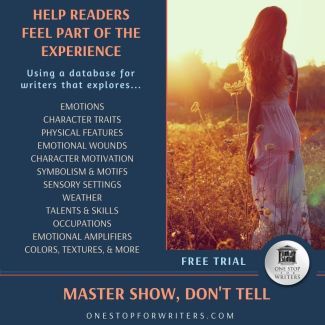 Need More Descriptive Help?
Need More Descriptive Help?While this thesaurus is still being developed, the rest of our descriptive collection (15 unique thesauri and growing) is accessible through the One Stop for Writers THESAURUS database.
If you like, swing by and check out the video walkthrough, and then give our Free Trial a spin.
The post Relationship Thesaurus Entry: Imaginary Friend and Child appeared first on WRITERS HELPING WRITERS��.
April 8, 2021
Want a Stronger Manuscript? Read It Aloud

Editing freaks a lot of people out. Drafting is creative and inspirational, and every writer LIVES for that moment when you get into the groove and the words just flow. But editing is kind of the opposite. It���s analytical, with a rigid set of rules that have to be followed. I think this is why so many writers say it���s their least favorite part of the process.
I���m one of those weird people who love the revision stage. LOVE. IT. It���s one reason I started our monthly Phenomenal First Pages contest. I really like reading a passage of writing and picking it apart, examining it from a macro and micro perspective to see how it can be improved.
In the entries that I critique, I see a lot of the same mistakes, which means I offer a lot of the same suggestions. And one bit of advice that I say A LOT is Read your work aloud. It���s one of those little practices that are so simple but can help your story in huge ways.
Why Does It Work?The bottom line is that we can read in our heads super fast. But when we read out loud, we���re forced to form the words with our mouths, which takes more time. This results in a slower process, and when we slow down, the brain can more accurately see what it’s reading.
Mental reading results in a certain amount of brain processing as we���re seeing, analyzing, and comprehending the words on the page. But reading out loud adds an auditory element as our brain not only sees the words but hears them, too. More processing is involved. More processing requires more brain power and leads to better editing, comprehension, and pretty much everything else the brain is doing at the time.
Bottom line? When you read your work aloud, you catch a lot more mistakes than when you zip through a manuscript mentally. Here are some of the issues that reading aloud can help you see and resolve.
1) Typos and the LikeWe’re so familiar with our own stories that when we read them in our heads, our brain tends to see what it knows we meant to write rather than what we actually wrote. The process of reading aloud helps us see (and hear) the typos, misspellings, word omissions, and other minor mistakes that can result in a messy manuscript. So from a simple proofreading level, reading out loud can have a major benefit.
2) Poorly Structured SentencesWhen we read out loud, we’re more likely to read the words the way they would be spoken. So when we get to a rambling or wordy sentence, we stumble. That verbal fumbling is a sign that the sentence isn���t clear and needs revision. It���s not as likely to happen when we read in our heads, so reading out loud is great step toward tightening the writing.
3) RepetitionsOne thing that catches the reader���s attention in a bad way is repeated words and sentence structures. Three sentences in close proximity that start with I, multiple sentences that are structured similarly, or even repeated usage of a normally invisible word like cold���these repetitions can start to grate on the reader���s ears. Read those passages aloud, and the repetitions will grate on your ears, letting you know which words and phrases need to be rewritten.
 4) Confusing Passages
4) Confusing PassagesWhen we���re not mentally racing through a paragraph, it���s easier to be more analytical, and one thing we should always be aiming for with our writing is clarity. Does this make sense? While reading aloud, you can keep questions like this in the back of your mind, and it will become more obvious when something is confusing or vague.
5) Pacing IssuesWe all know what it’s like to read a scene that’s a little boring: we’re hit with the urge to skim ahead to the interesting parts. That skimming becomes more obvious with verbal reading because you hear yourself skipping content. Identifying the issues in our writing is sometimes the hardest part of the problem, and pace is one of those sneaky buggers that doesn���t announce itself. So slowing down and reading the words aloud can provide a better opportunity to see where the pace is dragging. (Psssst���it also works on the flip side, for passages with too-abrupt shifts.)
6) Unrealistic Dialogue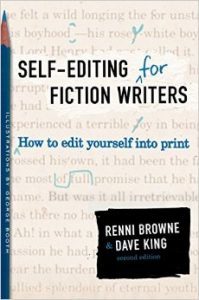
Readers are intimately familiar with dialogue because it���s how they communicate. So stiff, stilted, or unnatural dialogue is going to pull them right out of the story. Reading aloud can help you identify places where your character���s speech needs to be refined. Here���s what Browne and King, authors of Self-Editing for Fiction Writers, have to say about this:
���We���re used to hearing relaxed, normal speech in real life. much of the stiffness in a passage of dialogue that doesn���t show up when you read your work silently will spring right out at you when you read out loud. You may find yourself making little changes as you read. If so, pay attention to these changes���your ear is telling you how your dialogue should sound.���
One of their suggestions is to have a friend read through a passage of dialogue with you, like it���s a screenplay. You can also record yourself reading a scene���s dialogue. Either way, hearing the dialogue spoken aloud will give you ideas on where it might not quite ring true.
7) Voice InconsistenciesFor me, getting a character���s voice right is one of the hardest things. Just figuring out all the nuances of a character’s individual voice is hard enough, but then you have to write it consistently through the entire story. But Browne and King come to the rescue again, with an interesting solution to this problem.
They recommend reading aloud each character���s point-of-view passages consecutively. By putting them all together, you remove any other character���s narration and can focus solely on one character at a time. This allows you to hear any inconsistencies in their voice.
8) Lack of EmotionA common issue that I see in critiques has to do with character emotion���the lack of it, to be specific. If we want to really engage readers, we have to tap into their emotions, and one of the easiest ways to do that is to clearly communicate the character���s emotion. Yet too often, it���s not clear what the character is feeling, so the reader doesn���t know what they���re supposed to feel.
When we read aloud, we tend to naturally read with inflection. If your reading sounds flat and dull, it���s very possible that it’s missing the important emotional piece. Examine your character. Is their emotional state clear? Is it being conveyed in a way that���s engaging for readers���shown, instead of told, through physical cues, internal visceral reactions, dialogue, and thoughts?
The benefits of reading your work aloud kind of go on and on. I suggest verbally reading your whole manuscript at some point���not all at once, and not even consecutively. But reading every word aloud during the revision process is going to improve your story in lots of small (and not so small) ways, leading to a much more satisfying experience for your readers.
The post Want a Stronger Manuscript? Read It Aloud appeared first on WRITERS HELPING WRITERS��.
April 6, 2021
Help Us Help You! (+Giveaway Ending Soon)
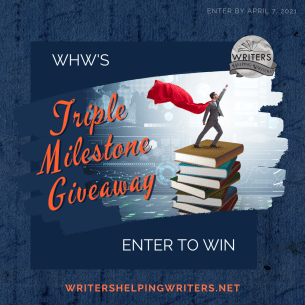
Hi guys! Late last week we peeled back the curtain on our new site design (finally!) and have a pretty terrific giveaway going on right now to celebrate. Have you entered it yet?
If not, go do that. I’ll wait.This redesign has been a long time in coming, and we’re pleased with it, but of course what really matters is if you are happy with it! So if you have a moment, let us know what you think? You can drop us an anonymous note here.
If you’ve not poked around the home page yet, let us highlight one area we hope will make life easier:

WHW (and The Bookshelf Muse before it) have been around a long time, meaning there’s a metric ton of information here to absorb. This new area acts as a jumping off point for key areas of focus.
We’re still finishing this section by addressing the most common writerly PAIN POINTS. We’d love your help though, so if there’s a pain point you’d like to see included, let us know, and we’ll see what we can do.
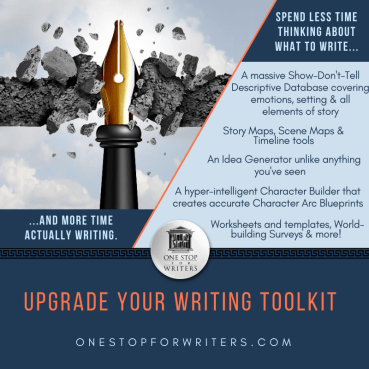 Don’t forget…
Don’t forget…As part of our Three Milestone Celebration, we created a 75% off code for anyone wanting to try One Stop for Writers:
MILESTONE(This code is only active until April 8th, so grab it soon!)
To use this 75% discount…Register or sign in at One Stop for Writers. Go to the Account tab and add the code MILESTONE on the My Subscription page. Select the 1-month plan. This will reduce this first month to $2.25! Nice, right? (Note, this discount code can only be used with the 1-month plan.)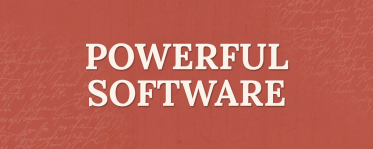
Those of you who already use the site will be happy to see there’s a direct access button on the home page now, meaning you can get from here to there even quicker! —>
One Stop for Writers has become a big part of how we help writers and we really wanted this design to tie the two together. We hope we’ve achieved that, and you like the new look!
The post Help Us Help You! (+Giveaway Ending Soon) appeared first on WRITERS HELPING WRITERS��.
March 31, 2021
Surprise Giveaway: Writers, Come Win Something Awesome!
So, I think we can all agree it’s been QUITE a year. Most of us feel like we’ve aged 10 years.
BUT.
We’re turning a corner, oh-so-slowly, but it’s happening. So let’s celebrate hope. And optimism.
And while we celebrate these, Becca and I have a few things to add, milestones we’ve skipped over as it never felt like a good time with everything else going on in the world. Yes, Covid is still here, but we’re breathing a bit easier as vaccines roll out. Plus, can’t we all use some celebratory cheer just now?
So, drum roll….and go!
A business milestone. Becca and I don’t often talk about the business end of One Stop for Writers mostly because it’s a lot of hard work and would bore the pants off you. But as some of you know, at the end of 2019 we were hit with a curve ball when third musketeer/co-founder at One Stop for Writers decided to exit. Becca, Lee, and I had dreamed up OSFW and spent years building it and so the void he left was huge, especially as Lee handled the technology side while Becca and I created IP, ran the business, marketing, and day-to-day support. Being non-technical, we suddenly had a rapid, steep learning curve to be able to continue. Thankfully our core developer was our technology bridge and we were just figuring things out when Covid hit.

The business owners among you know the terrifying, wheezing-into-a-paper-bag feeling of having employees depending on you while the people you serve are rapidly cutting costs due to Covid. And in our case, we also had a partner to pay out. As a subscription-based business, we felt pretty vulnerable.
The long and short is we worked like crazy to pivot. Thankfully a lot of people decided it was a good year to write novels. 2020 was a trial-by-fire year for us as business owners, but we came through it stronger than before. A genuine thank you to everyone who subscribes to One Stop. You guys are so appreciated, and we love being able to help you!
Book Milestones. We’ve been sort of terrible about celebrating these the last two years. Becca and I write books, teach, and run our businesses on our own, meaning we’re usually too busy to take a breath. And honestly, so much horrible stuff has been going on in the world that pulling attention to ourselves would have felt totally wrong. So we passed our 500,000th book, and then our 600,000th book. We’re now moving closer to 700,000 and it’s time for us to take a moment and feel good about where we’re at. It’s exciting. More amazingly is we’ve achieved this through mostly word-of-mouth, as we don’t aggressively do ads or sales.
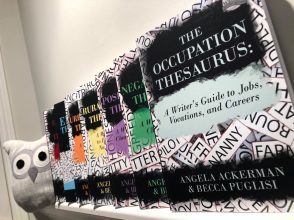
When we started down this thesaurus road we had no idea we were creating things that would allow us to help so many people. As you guys know, helping is what fuels us. Thank you all so much for being part of our journey and supporting us.
Finally, a website milestone! Writers Helping Writers has a new look! We moved to WordPress in 2013 and kept meaning to update our design but there was never time. The developer of our theme stopped supporting it after a time and in the summer of 2020, stuff started to break. By October, WHW’s theme was in cardiac arrest. So we hired Alexis at Eat, Laugh, Learn, and ta-da, here we are! Our branding matches our One Stop for Writers site now and our design has enabled us to put together some amazing pockets of information on the home page. HINT: Check out the I need help with… section!
We’re still updating (thank you for being patient) but this milestone prompted me to check our stats. Between Writers Helping Writers and our old Bookshelf Muse site at blogger, we’re over 11 million hits!
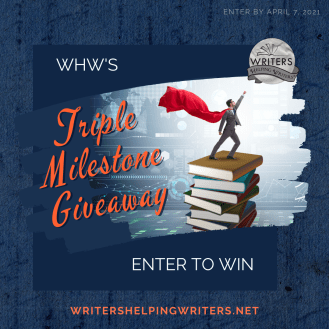
So, with hope on the horizon and these personal milestones to celebrate, it’s time to run up the giveaway flag.
And you, my friend, can win some amazing stuff!Prize #1: Nine editorial critiques
One thing we love about our job is that we meet so many talented, caring people in this industry. When our friends at Angelella Editorial heard about our desire to hold a giveaway to celebrate optimism, hope, and our personal milestones, they wanted to join in and have offered the most amazing set of prizes.
For those of you unfamiliar with this incredible editor collective, well, the team at AE are all about helping you put your best work on the page. Their clients have gone on to sign with dream agents, sell books at auction, and become bestselling and award-winning authors. Angelella Editorial also specializes in kidlit but also edits new adult, adult & literary fiction, nonfiction, business books, short stories, plays, poetry, and screenplays, the whole package, and here’s what you can win:
From Kate Angelella , a 5-page critique (any genre) and 30-minute follow-up call for brainstorming or anything other literary thing the winner wishes to discuss!From George Jreije , a 10-page or query critique (any genre!)From David Fey , a 10-page critique (YA, NA, or Adult), in any genre, plus an optional 30-minute follow-up call!From Danielle Sunshine , a 10-page critique of MG, YA, New adult, or memoir. (No high fantasy or erotica).From Diane Telgen , a Picture Book critique or first 10 pages of a MG or YA, any genre. Diane will answer questions by email if the winner has any.From Denise Santomauro , a 10-page critique of MG, YA, or Adult, any genre, plus a 30-minute follow-up phone call.From Emily Young , a 10-page critique of MG, YA, NA, or Adult fiction, either speculative (science fiction / fantasy) or action/adventure, plus a 30-minute phone call.From Jay Whistler , a synopsis critique for MG or YA. (No SFF, please).From Jenn Bailey , a Picture Book critique (no rhyming) or the first 10 pages of a MG, any genre. Jenn will also give a 30-minute follow-up call to the winner afterward.Holy Bananas, am I right? Very excited to see who wins these critiques. I encourage you to follow each editor’s links to get a feel for who might be the best fit for you, and while you’re there, poke around. Angelella Editorial also has a terrific podcast, blog, and offers coaching if you need it, too.
The form to enter for a chance to win a critique is here. Enter for any you wish (that match your genre!). If you win, your name will be excluded from other critique draws only. This way we can spread the love when it comes to professional feedback.
Prize #2: A Hot-off-the-Presses Copy of Wide for the Win (6 books to be won)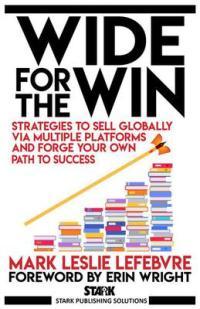
Mark Leslie LeFebvre is brilliance in a bottle. The former self-publishing director at Kobo and current director of business development at Draft2Digital, Mark is intensely curious and innovative, and is always seeking to use his knowledge to help others. And he does so in a big way with this one-of-a-kind guide, Wide for the Win.
If you are looking for ways to stop being dependent upon only Amazon for your author income, to expand and grow your sales on multiple platforms around the world, and to create a “publish wide” strategy, then this is the book for you! Six copies are up for grabs: 5 Digital and one Print!
Authors, you need this book! Enter for Wide to Win right here.
Prize #3: A Character Traits Thesaurus Box Set (3 sets to be won)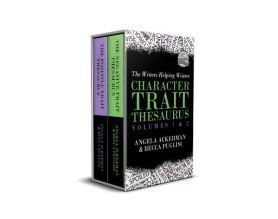
The Positive Trait and Negative Trait Thesaurus are fan favorites for their ability to help writers build amazing, one-of-a-kind characters, and work best when used together, so we’ve bundled them up. But rather than squish two books together in a digital box we’ve actually cross-linked them, meaning if you follow a link from an entry in the Positive Trait Thesaurus that goes to an entry in the Negative Trait Thesaurus, BOOM, it takes you there.
Is this witchcraft? Do the two books exist in a parallel universe? WE DON’T KNOW. But you could maybe win one by going here.
Prize #4: A 6-Month Subscription to One Stop for Writers (2 to be won)If you like what Becca and I do with our books and at WHW, we encourage you to come visit us at One Stop for Writers. It’s where we help writers beyond our writing guides. How? By tackling our “I wish this writing tool existed” list and building storytelling tools that are game changers.
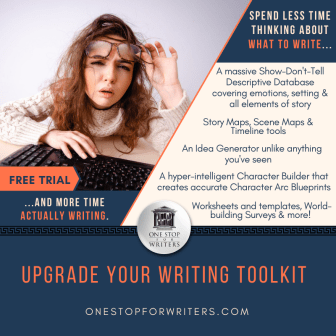
We aim to make a writer’s life easier, and whether it’s our Character Builder that’s smart enough to take key details about the character you’re brainstorming and create an accurate Character Arc Blueprint for you, the largest descriptive THESAURUS database found anywhere (15 topics and growing), or something else, you’ll find it at One Stop. Enter for a chance to win here, and then go sign up for One Stop’s Free Trial.
Ready to win yourself something amazing? Enter for all draws below, and good luck! (No purchase necessary, no cash value, subject to legal blah-blah here.) Giveaway ends April 7th, midnight EST.
ENTER ALL DRAWS HEREAnd because we know everyone can’t win…
We have something anyone can use if they like: a 75% off code at One Stop for Writers. To use it, register or sign in, and then visit My Subscription, add the code MILESTONE, and select the 1-month plan. This will reduce your first month to $2.25.
Code expires April 8th.
Happy writing, all!
The post Surprise Giveaway: Writers, Come Win Something Awesome! appeared first on WRITERS HELPING WRITERS��.
March 30, 2021
How to Give a Great Podcast Author Interview
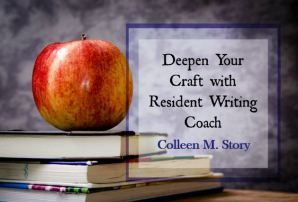
by Colleen M. Story
As an author, one of the best ways you can reach new audiences is through podcasts.
According to Edison Research and Triton Digital, there are now 62 million Americans listening to podcasts each week, up from 19 million in 2013. We have about 800,000 active podcasts available to listen to, with a record 192,000 new ones launched in 2019.
It���s a huge market for writers, and hosts are always looking for entertaining and interesting guests���like you!
Once you���re invited to speak on a podcast, it may be tempting to just show up and chat. But for most authors, that would be a mistake for two reasons:
Your goal is to attract new readers/subscribers to your platform.Those readers are going to be listening to your conversation!To increase your odds that you���ll make a good impression on your listeners���and perhaps convince some of them to read your work���keep the following tips in mind.
5 Tips to Help You Win New Readers on a Podcast Interview1. Remember your job is to help the listener.This is the number-one mistake most authors make when appearing on a podcast. They arrive unprepared and spend their time chatting about whatever subject happens to come up. This is dangerous because:
You may fail to give the listeners anything of value, missing your opportunity to connect with them.Listeners may get bored!Of course, it’s important to have fun and enjoy the conversation, but remember that you’re there to help the host’s listeners however you can. Usually, that involves sharing some of your expertise or experiences that will benefit others.
2. Ask your host what their audience is looking for.Speaking of listeners, it���s important to understand what your host���s listeners are looking for. Why do they come to this particular podcast? What problems do they need to be solved?
You can address this question in a couple of ways. First, check out the podcast and listen to a few episodes before your scheduled appearance. Familiarize yourself with the type of issues they address and then figure out how your message can help those listeners.
Second, simply ask your host: ���What do most of your listeners need help with? What are they looking for on your podcast?��� Most hosts will be happy to tell you about their audiences, and you can use that information to come up with a few key points that you know will help those people.
 3. Prepare a few talking points beforehand.
3. Prepare a few talking points beforehand.Part of the fun of podcasts is enjoying the spontaneity of the conversation, but your host and your listeners will appreciate it if you prepare a few talking points ahead of time. Even if you know your stuff cold, after you���ve found out what the podcast audience is looking for, go back and prepare a few nuggets of wisdom you can pass onto them, and then do your best to get those into the conversation.
To a group of readers, for instance, you may talk about what your new book has to offer in terms of excitement, characters, and plotline, or even what themes it addresses that you think are pertinent to those readers��� interests.
To a group of writers, on the other hand, you may talk about the struggles you experienced writing the book and how you got past them, or offer some tips on the publishing or marketing process.
You can even supply talking points to your host if you like. This tends to focus the conversation and make it much more useful to listeners than if you both just wing it. Many hosts love it, too, as it reduces their workload.
4. Be professional.It seems this would go without saying, but some authors forget that yowling cats, barking dogs, or hollering children aren���t welcome in everyone���s ears. On podcast day, make sure you are in a quiet space and that you won���t be disturbed while you���re talking.
Check all your equipment���your computer, earphones or headphones, and your microphone, if you have one���to be sure everything is ready to go and fully charged. If your podcast is going to have a video component, consider dressing for the part. You may be used to wearing sweats at home, but if you���re going to be presenting yourself to an audience, prepare as you would for an in-person group to give yourself the best chance of winning them over.
Finally, be gracious to the host. It���s easy to forget in the middle of the conversation that this is a conversation. Writers can get so wrapped up in coming across well that they may talk too much, making the podcast more of a speech than a chat.
You want to get your points across, but you also want to respect the other person you���re talking to. Relax, exhale, and stay aware of the balance between you and your host. Though it���s the host���s job to interview you, don���t be afraid to turn around and ask the host a question now and then too.
 5. Give listeners every chance to find you.
5. Give listeners every chance to find you.At the end of the day, there���s one main reason you���re appearing on a podcast: to grow your author platform. That means you want to give listeners every chance to find you after the talk is over.
Ask your host beforehand if it���s okay if you mention that you have a free item on your website that listeners can download after the talk is over. Maybe that���s a free book, chapter, report, or another goodie you have available for new subscribers.
Also, make sure you send your host all the material he or she asks for beforehand. These typically include your bio, headshot, website, and social media links. You can also feel free to mention your website at the end of the chat, and encourage listeners to go check it out for their free item.
Many authors forget this critical step, and it results in a huge lost opportunity. Take advantage of the opportunity a podcast presents and you���re likely to find that you can grow your audience while having fun at the same time.
Note: For more information on building your author platform, get your FREE chapters of Writer Get Noticed! here.
Have you guested on a podcast & have tips to share? Let me know in the comments! Colleen M. StoryResident Writing Coach
Colleen M. StoryResident Writing Coach
Colleen inspires writers to overcome modern-day challenges and find creative fulfillment in their work. Her latest release, Writer Get Noticed!, was a gold-medal winner in the Reader���s Favorite Book Awards. Overwhelmed Writer Rescue was named Book by Book Publicity���s Best Writing/Publishing Book in 2018. Colleen frequently serves as a workshop leader and motivational speaker.
Writing and Wellness | Author Site | Twitter
The post How to Give a Great Podcast Author Interview appeared first on WRITERS HELPING WRITERS��.
March 27, 2021
Relationship Thesaurus: Bully and Victim
Successful stories are driven by authentic and interesting characters, so it’s important to craft them carefully. But characters don’t usually exist in a vacuum; throughout the course of your story, they’ll live, work, play, and fight with other cast members. Some of those relationships are positive and supportive, pushing the protagonist to positive growth and helping them achieve their goals. Other relationships do exactly the opposite, derailing your character’s confidence and self-worth or they cause friction and conflict that leads to fallout and disruption. Many relationships hover somewhere in the middle. A balanced story will require a mix of these dynamics.
The purpose of this thesaurus is to encourage you to explore the kinds of relationships that might be good for your story and figure out what each might look like. Think about what a character needs (good and bad), and build a network of connections for him or her that will challenge them, showcase their innermost qualities, and bind readers to their relationship trials and triumphs.

Description: In this situation, there’s an unfair balance of power, with one party using their power to consistently belittle, insult, abuse, or take advantage of someone who is more vulnerable. While we see this too frequently with children and teenagers, it happens in adult relationships, too. Severe adult bullying situations often go by more sophisticated names, such as domestic abuse, stalking, or sexual harassment.
Relationship Dynamics:
Below are a wide range of dynamics that may accompany this relationship. Use the ideas that suit your story and work best for your characters to bring about and/or resolve the necessary conflict.
The victim standing up to the bully (which can result in the bully moving on to other victims over time)
The bully vacillating between abusing the victim and treating him/her well
The victim going out of their way to avoid the bully, resulting in much inconvenience
The victim currying favor with the bully, trying to get on their good side
The victim laughing off, dismissing, or even making excuses for the bullying behavior
The bully targeting the one victim vs. multiple victims
The bully targeting only certain aspects of the character’s life (their physical appearance, their capabilities at work, their gender/race/religion, etc.) vs. a generalized bullying that is less predictable
A bully using subversive, covert methods (gaslighting, manipulation, etc.) that are harder to recognize and prove than overt abuse
Conflicting Desires that Can Impair the Relationship
The bully wanting to exert power over a victim who wants to stand up for him/herself
The victim seeking respect or acceptance from a bully who only wants to domineer and belittle
A victim seeking self-respect and a bully who wants to tear it apart
A bully who wants to continue exerting control over a victim seeking revenge
Clashing��Personality Trait��Combinations: Controlling and Stubborn, Pushy and Volatile
Negative Outcomes of Friction
Physical injury
Death
The victim being publicly humiliated
The victim believing what the bully says about him or her
The victim giving in the bully (refusing to fight back)
Paralysis; the victim not know what to do, so they do nothing
The victim entertaining suicidal thoughts
The victim’s work being negatively impacted (due to decreased efficiency or them taking days off to avoid the bully)
Developing physical or mental ailments (stress headaches, ulcers, insomnia, panic attacks, depression, etc.)
Fictional Scenarios That Could Turn These Characters into Allies
An apocalyptic scenario (a pandemic, an impending meteor strike)
A less dramatic threat to their environment: a new principal who wants to control everyone
A common passion���e.g., discovering that they both love K-Pop, WWII documentaries, or pickle-flavored foods
Them needing to join forces to land a client at work or win a competition
The bully needing help with something the victim is capable of providing (medical attention, tutoring, specific information, etc.)
Ways This Relationship��May��Lead to Positive Growth
The victim learning to stand up for him or herself
The victim banding together with other victims and finding his or her tribe
The bully being bullied, resulting in a change of heart toward his/her victims
A bully being forgiven or shown grace by a victim, leading him/her toward personal growth
The bully being confronted with their personal wounding event and realizing that their bullying behavior is an outgrowth of that, which leads to internal growth
Themes and Symbols��That Can Be Explored through This Relationship
A Fall from Grace, Coming of Age, Crossroads, Danger, Enslavement, Evil, Freedom, Friendship, Innocence, Isolation, Perseverance, Pride, Suffering, Vulnerability
Other Relationship Thesaurus entries can be found here .
Need More Descriptive Help?
While this thesaurus is still being developed, the rest of our descriptive collection (15 unique thesauri and growing) is accessible through the One Stop for Writers THESAURUS database.
If you like, swing by and check out the video walkthrough, and then give our Free Trial a spin.
The post Relationship Thesaurus: Bully and Victim appeared first on WRITERS HELPING WRITERS��.
March 25, 2021
Heinlein’s Rules of Writing: Principles for Success
I want to talk today about a topic I���ve been pondering for years. YEARS. It���s Heinlein���s Rules of Writing.
If this is new to you, it’s a framework for writing success that consists of 5 rules established by Robert A. Heinlein���aeronautical engineer and pioneering science fiction author. Writers who ascribe to his process swear by it on a Crossfit/Natural Oils level. They’re prolific, successful, and happy with their work. We���re talking authors like Dean Wesley Smith, with 150 novels and hundreds of short stories written while following the rules.

Heinlein first outlined his rules in Of Worlds Beyond: The Science of Science Fiction Writing (1947). In his contribution to the compilation, he wrote the following, largely as an afterthought to his article:
���I���m told that these articles are supposed to be some use to the reader. I have a guilty feeling that all of the above may have been more for my amusement than for your edification. Therefore I shall chuck in as a bonus a group of practical, tested rules, which, if followed meticulously, will prove rewarding to any writer.
You must write. You must finish what you start. You must refrain from rewriting (except to editorial demand). You must put it on the market. You must keep it on the market until sold. “They look so simple, and most of them make a lot of sense. But some of it flies in the face of what many of us have learned. And some of Heinlein���s devotees would say this is exactly the problem���that we���ve educated ourselves out of the creative process that allows our brains to generate ideas and transfer them to paper in story form. To a certain degree, they���re not wrong.
But I���d also suggest that the writing world is different today than it was in 1947. The way we���re taught to write in school, the availability of self-publishing options, the vast array of writing resources on the market (of varying quality)���these are just a few of the things that have changed for writers since Heinlein���s day, and I believe changes like these have made it harder for most people in 2021 to follow Heinlein’s process.
Personally, I don’t agree with every rule, but each one contains a nugget of wisdom���principles that can help any writer accelerate their journey toward authorial success. So if you’re looking for a new process, a kick in the pants, or even a friendly debate about what works and what doesn’t, allow me to expend a few extra words today to share how I believe Heinlein’s Rules can help you.
And if you love Heinlein’s Rules as they are, forgive me for the liberties I’m about to take ;).
1. Write
This is as true today as it ever was. If we want to grow into great writers, the bulk of our time must be spent writing. Not researching, or editing, attending conferences, marketing, etc. All of these are important, but writers can get so caught up in everything else that they spend very little time doing the one habit that’s non-negotiable. Acknowledging this can keep us from getting derailed and help us maintain focus on what really matters.
2. Finish What You Start
Absolutely true. This rule is necessary because it forces the writer to not give up when things get tough, to see the story through to its end. It���s also a good rule of thumb for anyone who���s easily distracted by Shiny New Ideas and has more partial works than completed ones.
Granted, sometimes it���s smart to take a break from a story and work on something else. That can be exactly what you need when you���re stuck. But I���d say it���s generally a good idea at some point to return to that first story and get ���er done because the writing itself is the best teacher. The more we struggle and persevere, the more we learn and improve. And, honestly, those of us who want to make a career out of writing need to get in the habit of finishing.
3. Refrain from Rewriting (Except to Editorial Demand)Ack. This is where I get hung up. The Heinlein���s Rules devotees I���ve spoken to are able to adhere pretty strictly to this rule. They write the story then move on to the next one. Or they give it one or two revision passes at most.
I shudder to think of what my stories would look like after only one round of revision. I. SHUDDER. Along with anyone who reads those stories. But there are a few principles here that we shouldn���t ignore:
1. Too much revision can kill your story
2. Too much revision = not enough writing (see Rule #1)
3. Not all feedback should be applied to your story

Many authors get stuck in the revision stage, spending months going over a story and making changes. It starts to feel overworked, and we get sick of our own work, which is never great for the creative process. Too much revision can also result in you killing your character���s voice as you fiddle and fuss with the text.
Even so, the vast majority of writers don���t start off writing perfectly crafted stories. They have blind spots and areas of weakness. Their stories need revision. So I���ve got a couple of amendments for this rule.
Amendment #1Set a limit on how many revision rounds you���ll do, and stick to it. Once you���ve finished those rounds���even if the product isn���t as good as you���d like���move on to the next story. The more you write, the better you���ll get at crafting stories, and the less revision will be needed in the long run.
My new friend Harvey Stanbrough, who adheres to Heinlein���s Rules (with much success, I might add), shared a great bit of advice with me about how he shortens the revision learning curve.
���I recommend having one technique in mind���for example, pacing or dialogue or depth of description, etc.��� as you begin each story. That���s how you improve. Practice and learning, learning and practice.���
I love this because it���s something authors can do in the drafting stage to accelerate their learning in a given area, which eventually results in less revision.
Amendment #2Another thing Harvey recommends is the use of first readers. Immediately upon completion of his first draft, he emails it to certain readers. Some, he says, are writers, but some aren���t. All that matters is that they���re avid readers, and they���re not looking for certain things. They���re just reading for entertainment, and if something pops out at them or they notice anything that���s off, they let him know.

There���s obviously a benefit to being advised by writers who are farther along the path than we are���people who can help us see what we don’t yet know and school us on the more complicated aspects of storytelling. If you’ve hung around our blog at all, you’ve heard us natter on about the benefit of critique groups and getting feedback for your work. No need to flog that topic further.
But if I can generalize here, I’m finding that many readers don���t care about the rules of grammar or which dialogue tags are used. They just don���t. They care that the story is entertaining or relevant or holds their interest. Truth is, if you���re a fiction author, those people are your audience, not the writers. So getting feedback from regular, run-of-the-mill readers can also be super beneficial in letting us know how what we need to work on and how close our work is to being done.
Amendment #3Note that Heinlein doesn���t say anything here about editing. You can write an excellent story, but if it���s got typos, misspellings, and the like, you���re going to lose readers. So it���s my opinion that every story can benefit from a copyeditor���s eye. That you can do while remaining true to the spirit of the revision rule.
You Must Put It on the MarketAgain, I say Ack.
When Heinlein was writing, the only real way to put your work on the market was to submit it to a book or magazine publisher. If they didn���t like it, or if it wasn���t up to par in terms of quality, then it didn���t get published. No harm done.
But there’s no one in self-publishing to close the door on a story before it hits the shelves. Literally anyone can publish any book, no matter how poorly written it is. And with that, harm can be done. You can���t undo crappy reviews. Like an ill-advised tattoo, those reviews of your early books are forever.
This is where the writer’s gut comes in. A lot of the time, we know when a story isn’t ready. When we’re not sure, reader feedback can push us in the right direction. When they���re saying things like, ���I didn���t understand this part,��� or ���What happened to the neighbor from chapter one?��� or “I kind of lost interest here,��� you know you���re not quite there.
Becca’s two cents: Not every book should be published. But the more you write, the more publishable books you’ll be able to create. And as you learn along the way, you’ll get better at knowing when your work is ready.
Keep It on the Market until SoldIn the old days (when submitting to publishers was the only option for getting a book to market), this was a good suggestion, encouraging authors not to give up too early. We���ve all heard Rowling���s story. Imagine if she had thrown in the towel after the first few rejections. So if you’re wanting to publish traditionally, it’s not a bad idea to keep sending out submissions.
When you���re self-publishing, though���it depends. If you���ve had a book for sale for a while and it���s not selling, it���s probably not going to sell until something changes. Maybe you grow in your craft and start writing better books that start selling, and then your audience discovers your earlier works. Or a very currenty event occurs that ties into your story���s theme and all of a sudden people are looking for stories like yours. So in the case of a book not selling because it (or you) just haven���t been discovered yet, there���s no harm in leaving it on market.
But it’s always possible that your book isn���t selling because you published it before it was ready. For indie authors, having that book out there could cause harm because people who read it won���t be inclined to buy your other books. And if they slap it with a bad review, other potential readers can be turned off, too. So if a book is getting panned, I���d say it���s a good idea to put it away and…that’s right. Write the next book.
In Conclusion���No writing process is perfect for every person; this is why there are so many of them out there. Regarding Heinlein’s Rules, people who follow them religiously won���t be happy with the liberties I���ve taken. And that���s ok. If the process works for them, they should run with it. No alterations needed.
But for others, I would say that there’s no harm in tweaking. The rules have good bones. If you can���t get 100% on board, accommodations like these just might propel you along your journey to writing success.
If you���re interested in learning more about Heinlein���s Rules, check out these resources:
Harvey Stanbrough���s Series of Posts on Heinlein’s Rules
Heinlein���s Rules: 5 Simple Business Rules for Writing, by Dean Wesley Smith
Heinlein’s Rules for Writing and How to Break Them
Questions? Suggestions? Flaming Bags of Poo?
Hit me in the comments.
The post Heinlein’s Rules of Writing: Principles for Success appeared first on WRITERS HELPING WRITERS��.
Writers Helping Writers
- Angela Ackerman's profile
- 1014 followers



